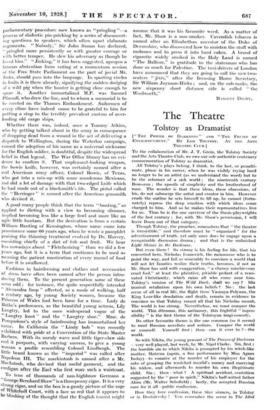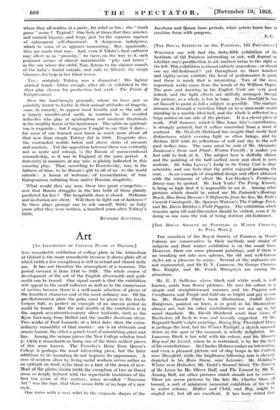The Theatre
Tolstoy as Dramatist
[" THE POIVER Ore DARKNESS " AND "THE FRUITS OF ENLIGHTENMENT." BY LEO TOLSTOY. AT THE ARTS THEATRE. CLUB.]
To the collaboration of Mr. J. T. Grein, the Tolstoy Society and the Arts Theatre Club, we owe our sole authentic centenary commemoration of Tolstoy as dramatist.
All Tolstoy's plays belong, I think, to the last, or penulti- mate, phase in his career, when he was visibly trying hard no longer to be an artist (as we understand the word) but to be the reformer of a sick world ; the nineteenth century Rousseau; the apostle of simplicity and the brotherhood of man. The wonder is that these ideas, these obsessions, of his, do not submerge the artist and creator in him. However crude the outline he sets himself to fill up, he cannot (fortu- nately) repress the deep emotion with which ideas come charged to him. And so he makes their representatives live for us. Thus he is the one survivor of the thesis-playwrights of the last century ; for, with Mr. Shaw's permission, I will leave Ibsen out of that category.
Though Tolstoy, the preacher, remembers that "the theatre is irresistible," and therefore must be " organized " for the advertisement of truth, yet only once does he engage upon a recognizable discussion drama ; and that is the unfinished Light Shines in the Darkness.
But even there ! So strong is his feeling for life, that his converted hero, Nicholas Ivanovieh, the raisonneur who is to point the way, and fail so miserably to convince a world that will not let fanatics realize their truths, becomes, if not as Mr. Shaw has said with exaggeration, "a clumsy mischievous cruel fool," at least the plaintive, pitiable pedant of a reno- vated Christianity, which ruins all who come near him. Tolstoy's version of The Wild Diu*, shall we say ? His ironical retaliation upon his own beliefs ? No: the last scene of all in real life, the flight from Yasnaya Polyana, the King Lear-like desolation and death, remain in evidence to convince us that Tolstoy meant all that his Nicholas meant. The world is too strong. Nevertheless, we must conquer the world. This dilemma, this antinomy, this frightful " impos- sibility " is the first theme of the Tolstoyan tragi-comedy.
Its other favourite theme is the one common (so it seems) to most Russian novelists and writers. Conquer the world or yourself. Yourself first ; then—can it ever be ?—the world.
So with Nikita, the young peasant of The Powers of Darkness —very well played, last week, by Mr. Nigel Clarke. Sin, first : the horrible sin to which Nikita is prompted by his witch-like mother, Matrena (again, a fine performance by Miss Agnes Imlay)—to connive at the murder of We employer for the sake of grasping the wretched invalid's money and marrying his widow, and afterwards to murder his own illegitimate' child. Sin ; then—what ? A spiritual accident, contrition suggested by the "poor in spirit," Nikita's half-witted father Alcim (Mr. Walter Schofield) ; lastly, the accepted Russian cure for it all—public confession.
How they love confession, these Slav sinners, in Tolstoy or in Dostoievsky 1. You remember the scene in The Idiot
where they all confess at a party, for relief or fun : the "truth game " scene ? Typical ! One feels at times that they murder, and coinmit bigamy, and forge, just for the supreme rapture of subsequent self-abasement. A dangerous indulgence, which to some of us appears nauseating. But, apparently, they are made that way. And, even if Nikita's final outburst may affect us as "preachy," we have, on the way to it, such poignant scenes of almost unendurable "pity and terror" as the one where the child, Nan, listens to the sinister sounds of the baby's burial outside, and calls to Mitrich, the rough "abourer, for help in her blind terror.
Yes : certainly Tolstoy was a dramatist ! His lighter atirical touch—bitter enough, after all—is exhibited in the Aber play chosen for production last week :" The Fruits of Enlightenment.
Here the land-hungry peasants, whom we have just so painfully learnt to loathe in their animal attitudes of tragedy, come, in comedy, to appear most lovable and as the salt of a largely uncultivated earth, in contrast to the overfed imbeciles who play at spiritualism and amateur theatricals in the wealthy house of the landowner. The satire on spiritual- ism is exquisite ; but I suppose I ought to say that it dates ; for some of our learned men know so much more about all that now than simple Tolstoy did in 1889. Exquisite also, the contrasted worlds below and above stairs of servants and masters. Yet the opposition between them was evidently, not so acute and solemn, in the Russia of unconventional comradeship, as it was in England at the same period. A fraternity in manners, at any rate, is plainly indicated in this amusing play. That, according to Dostoievsky, was, in the fullness of time, to be Russia's gift to all of us--to the world outside : a lesson of welcome, of reconciliation, of true Europeanism radiating from native Russian simplicity.
' What would they say now, these two great evangelists— now that Russia struggles in the fate both of them plainly predicted for her ? The hospitable door is closed. Welcome and invitation are silent. Will there be light out of darkness ? So these plays prompt one to ask oneself, thirty or forty years after they were written, a hundred years after Tolstoy's birth.
RICHARD JENNINGS.













































 Previous page
Previous page